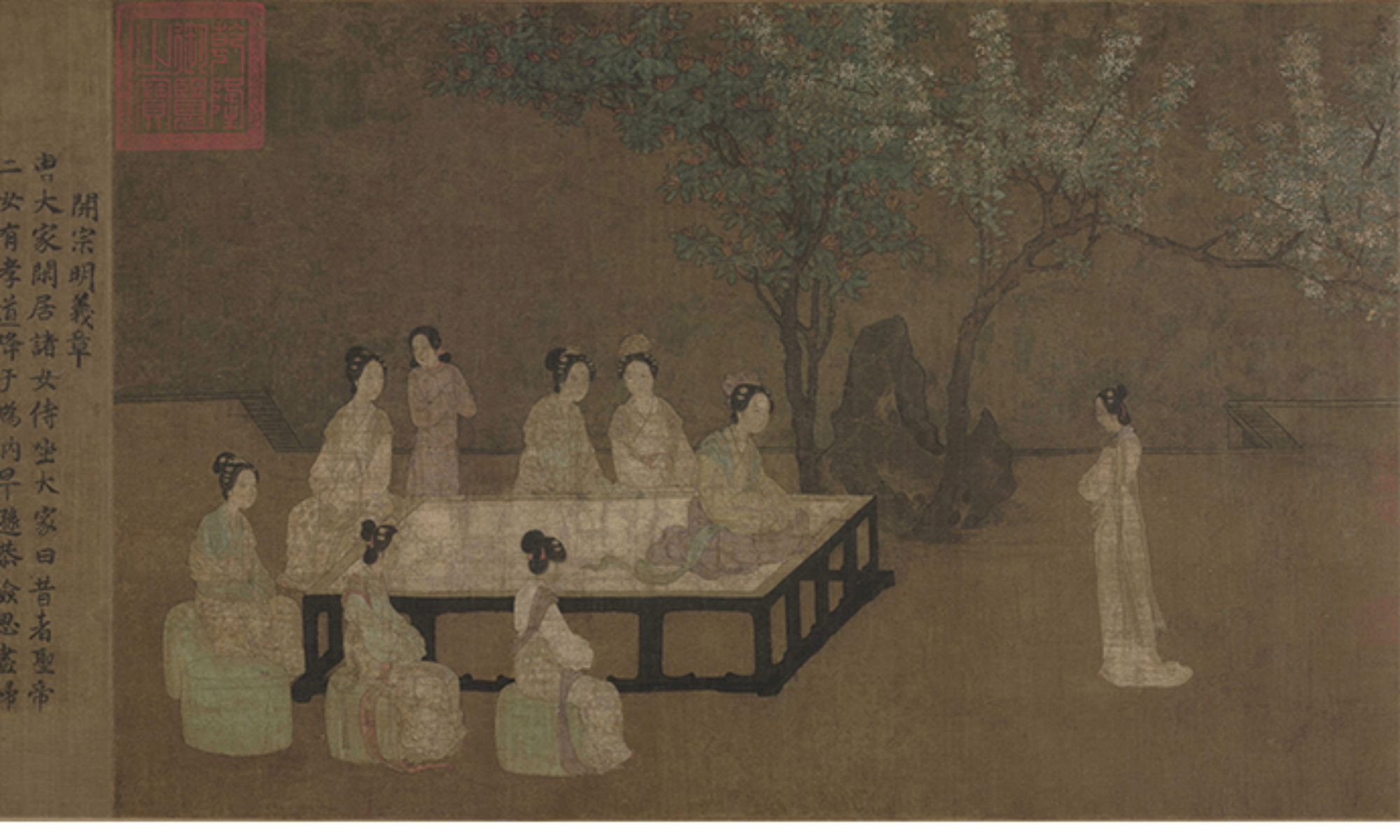The Ladies’ Classic of Filial Piety provides specific regulations on women’s morality for noble wives, concubines, and wives of ordinary people, and cites a large number of classics; thus the book is suitable for the educated ladies of the upper class to read. Madame Zheng reveals the requirements of women’s morality in Chapter Three “The Three Powers,” Chapter Five “Serving the Parents-in-law,” Chapter Six: “Government by Filiality,” and Chapter Eight: “Wives of Feudal Lords.” These four chapters provide standards for women in line with men’s psychology. First, it is stipulated that a woman’s words and deeds should be matched with her husband. Second, the prosperity of a large family needs to sacrifice ancestors. Then, wives must govern the members and servants of the family. The wives and concubines live in harmony without jealousy. The Beijing scroll depicts the role and behavior of women in the Confucian family according to related texts.
The chapter “The Three Powers” limits female filial piety to her husband and family. The most important rule is to obey the husband’s mind. The Beijing scroll depicts the related illustration that is similar to Chapter One “The Starting Point and Basic Principles.” The illustration of the chapter (Fig. 4.1) is visualized through the dialogue between the elderly wives and other young women. The painting portrays six women in the garden. Two older wives are sitting under a tree and talking with two other young ladies who are sitting opposite. On the left side, three maids are standing with flowers. Moreover, the inscription of “The Three Powers” describes the content of the dialogue. The young ladies in attendance asked, “Is the husband so great? “Pan replied, “The husband is heaven. The ancients used the word gui to refer a woman married to her husband. Man had to follow morality that respect heaven and earth. The nature of heaven and earth provides a pattern for one accordingly achieves the benefits of the land. If you guard against idleness and act with propriety, you will be able to establish the family. Moreover, the ancients used universal love, and gentlemen did not neglect filiality and charity. The ancients used respectful yielding, and gentlemen did not quarrel. They led them with rites and music and gentlemen lived harmoniously
In Chapter Five: “Serving the Parents-in-law,” the illustration (Fig. 4.2) portrays an old couple sitting on a mat indoors, and a young wife waits respectfully to serve an elderly couple for food. Women’s morality in this chapter emphasizes married women of all strata should treat parents-in-law like their parents. What’s more, the inscription of the Chapter describes more detail of the way to treat elders. In a woman’s service to her parents-in-law, she is as respectful as she is to her father and as loving as she is to her mother. Maintaining this attitude is righteous, and acting on it shows propriety. In the morning, she washes her hands and dresses to serve them. In winter she warms them, in summer she cools them, and in the evening, she settles them. She is respectful in straightening interior affairs and righteous toward the outside. Thus her propriety and sincerity established.
Chapter Eight: “Wives of Feudal Lords” depicts a woman who is kneeling to an elder man sitting under a tree (Fig. 4.3). The woman holds a water container in her hands, kneels respectfully, and gives it to the man sitting at the tree. From the text, it can be seen that the focus of this chapter is to teach the daughter-in-law to manage the relationship with other people in the elders to obtain the husband’s family approval. The chapter states that only a virtuous woman can govern the nine tribes with filial piety. Besides, the inscription of the chapter discusses how the wives to manage their morality. If rites and doctrines do not prescribe the clothing, woman does not dare to wear it; If the speech prescribed is not in the Classic of Poetry and Classic of History, woman does not dare to utter it; If it is not a sincere and virtuous action, woman does not dare to do it. If you want people not to hear something, nothing is better than not to say it. These are the filiality of wives of feudal lords.
The illustration (Fig. 4.4) of Chapter Six: “Government by Filiality” depicts the empress preparing for a ceremony at the entrance of the ancestral shrine, where the two servants wait on the left. The chapter stipulates the responsibilities of women are to help the husband’s family to protect the ancestral hall and to be careful in language, behavior, and dress. The painter portrays the empress as the protagonist. The empress plays a role model for married women in the upper class, especially the example of the royal women. A woman with a high status must be cautious in her words and deeds, in case her inattention endangers the reputation of the family. The chapter also emphasizes the importance of keeping sacrificial rites at all levels of society. Furthermore, the inscription of the chapter explains how virtuous women use filiality to manage their nine degrees of kin. Wives served their parents-in-law and thereby gained the goodwill of their six relations. Wives dared not insult the humbler members, thus they gained the goodwill of their superiors and inferiors and thereby served their husbands. Those who regulated the women’s quarters dared not slight the servants, thus they obtained the goodwill of everyone. Accordingly, while their parents were living, wives loved them, and they sacrificed to appease their spirits after parent’s death. By these means, wives harmonized the nine degrees of kin and did not cause chaos or calamity.
